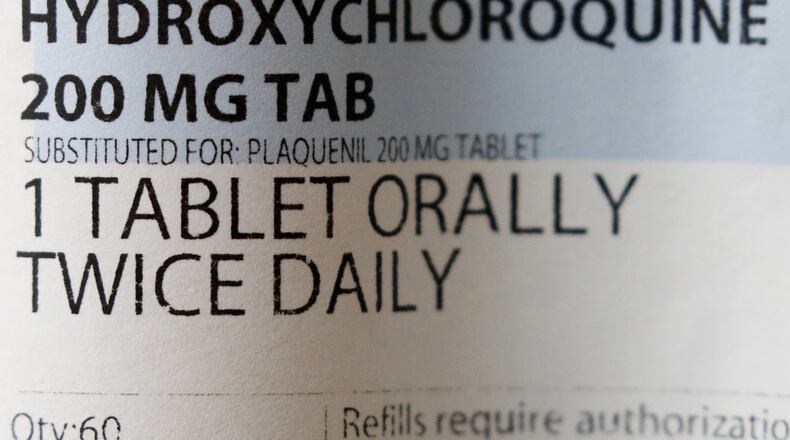With each passing day, it seems, the news becomes more alarming.
As the coronavirus marches across Georgia, it has touched nearly every corner of the state. In the past week alone, another 207 have died, bringing the number of Georgians who have fallen to this invisible enemy to 361.
Facing such grim statistics, everyone is praying for a miracle – a silver bullet, so to speak, that will stop the virus in its tracks.
But there’s one problem.
So far, a magic wand doesn’t appear to exist.
That’s what makes Tuesday’s announcement by U.S. Rep. Doug Collins so surprising – some may even go as far as to call it irresponsible.
In a press release, Collins celebrated the news that a pharmaceutical firm had donated 200,000 doses of hydroxychloroquine sulfate to Georgia’s Department of Public Health.
“On behalf of the people of Georgia, I want to thank Amneal Pharmaceuticals for this incredible donation,” said Collins. “This medication could be pivotal in Georgia’s fight against COVID—19 and could potentially save thousands of lives across our state.”
In his press release, Collins neglected to mention one key point.
There’s no clear evidence that the drug, as well as another anti-viral medicine, chloroquine, both used to treat malaria, rheumatoid arthritis and lupus, work against the coronavirus.
Dr. Kathleen Toomey, the commissioner of the state Department of Community Health, had already written a letter to physicians cautioning them against putting too much emphasis on the drugs.
Toomey should know.
As Georgia’s chief medical officer – and a doctor – she overhauled the Fulton County health department, and she also worked for the Centers for Disease Control and Prevention in a career that has spanned 40 years.
Gov. Brian Kemp has referred to Toomey as “the key advisor on all questions of public health for the state,” and throughout the crisis, Toomey has stuck to the science and the numbers.
Others have not.
All of which brings us back to hydroxychloroquine and chloroquine – drugs that some of us can’t even pronounce and many us haven’t heard of before.
In the nation’s battle against the coronavirus, the president has called the drugs a “game-changer.” In his press release, Collins touted the fact that Georgia was one of the first states to receive a donation from the pharmaceuticals firm. (Others include Louisiana, New York and Texas.)
Amid all of the anguish, hydroxychloroquine and chloroquine have provided glimmers of hope.
Just last month, the Food and Drug Administration issued an emergency authorization to permit the widespread use of hydroxychloroquine and chloroquine to treat severely ill patients in hospitals. “It is reasonable to believe that chloroquine phosphate and sulfate may be effective in treating covid-19,” the agency said.
With no other alternatives, doctors and pharmacists from more than half a dozen large healthcare systems in New York, Louisiana, Massachusetts, Ohio, Washington and California report that they are now treating patients hospitalized with COVID-19 with hydroxychloroquine. And some doctors say they are seeing encouraging results.
A general practitioner in upstate New York, for instance, told The New York Times that a three-drug cocktail of hydroxychloroquine, an antibiotic, azithromycin, and zinc sulfate has helped mitigate the infection in nearly 200 of his patients before they became sick enough to require hospitalization.
But so far, there have only been limited studies published by researchers in France and China. The extremely small sample size, as well as other problems, has rendered their findings statistically insignificant.
One French study, for instance, found progress in six – yes, six – patients with the coronavirus that had been treated with a combination of hydroxychloroquine and azithromycin.
Another study of 11 patients in France showed no evidence that the regimen works. Similar research in China also showed no benefit over the standard course of treatment.
Another point you didn’t read about in Collins’ press release?
The two drugs, it turns out, have some pretty dangerous side effects.
They can lead to a fatal heart attack in patients with cardiovascular disease or who are taking certain drugs, including anti-depression medications. With long-term use, the drugs can cause vision loss. Chloroquine has even been associated with psychosis.
So, while lawmakers, such as Collins, are celebrating the drugs’ healing powers, many health experts – both here, in Georgia, and around the country – are urging caution.
There’s Dr. Anthony Fauci of the National Institutes of Health, who has said hydroxychloroquine should not be considered a “knockout drug.”
There’s Dr. Patrice Harris, the president of the American Medical Association, who has said she wouldn’t prescribe the drug for a coronavirus patient because the risks of harmful side effects were “too significant to downplay.”
There’s Dr. Darria Long, an Atlanta emergency room physician, who worries that hydroxychloroquine will draw attention from other promising therapies. All of these treatments, including hydroxychloroquine, deserve careful evaluation and consideration, she said.
And there’s Toomey, the state’s public health commissioner.
She warned that patients suffering from other illnesses who depend on hydroxychloroquine could now be facing a shortage. Even before Tuesday’s announcement by Collins, the Georgia Pharmacy Association saw a greater increase in the number of prescriptions for the malaria drug in the state, Georgia Health News reported.
During these times, when we’re counting on our public officials more so than before, Collins should have at least mentioned the debate over the use of the drugs in his press release.
Though, in fairness to Collins, he did hit on some salient points.
The gesture by Amneal Pharmaceuticals, the New Jersey-based company that donated the 200,000 doses of hydroxychloroquine to Georgia, reminds us, as Collins wrote, of “the remarkable ways in which our country has rallied together to support one another in the face of this crisis.”
And Collins was correct when he declared: “We will beat this virus, and our nation will emerge stronger than ever before.”
But we’ll only do that if we’re guided by science – not a desire for a quick fix.
The Editorial Board.
About the Author




